Shame is one of the trickier emotions to understand. It can be complex for those unaware of its purpose. While shame can serve some adaptive social roles, in some cases it can be toxic for relationships and individuals. Knowing the distinction is crucial.
Shame is a social emotion.
Shame is one of the most important feelings when it comes to organizing society. It’s what keeps us close. Shame helps individuals recognize the threat of rejection or exclusion. It’s the motivator to follow the status quo.
Since human beings are social creatures, attachment is one of the key systems at play. Because of this, we are constantly evaluating our place in society.
Shame helps us check-in to see if we’re maintaining these important connections. In a sense, it’s the regulating system. It asks:
Is this acceptable?
Do I belong?
Am I cared for?
Shame is a wired programming for our connection to our sense of self and the world around us. This self-conscious emotion helps to regulate our relationships.
Toxic Shame
Toxic shame is powerful and sometimes even dangerous. This passionate emotion happens often in response to traumatic environments and insecure attachments. It occurs when we begin to label our personhood instead of our actions.
In these situations, rather than having a healthy sense of guilt for bad behavior, you label yourself as such. It goes from, “I made a mistake” to “I am a mistake.”
When situations with attachment figures involve dysfunction, often times shame steps in to protect the relationship. That’s right—shame helps to preserve turbulent emotional ties. If you can own the dysfunction happening, then it is easier to maintain proximity to a loved one.
He’s not abusive. I deserve that. I’m bad.
She’s not mean. I’m so weak, people should talk down to me.
By owning the neglectful or abusive treatment as something you deserve based on your merit or worth, you can continue to function in the relationship with a dysfunctional or dangerous other and make sense of the world around you. Those in toxic shame, deny their healthy attachment needs—tenderness, safety, affirmation etc.
Anger, sadness or pain is seen as a threat to the bond. Consequently, some people internalize it in order to preserve the closeness to the other.
If I hate me, I don’t have to hate them for how they treat me.
Often times, this faulty cause and effect explanation can serve to keep people active in unsafe relationships, not only with others, but themselves. As you can imagine, awful self-destructive behaviors are seen as permissible or even earned when your sense of self is so negative.
Healthy Shame
While we usually think of shame as something negative, typically it is a very adaptive emotion. Think about it. Have you ever met someone without shame?
Societally, those without shame tend to be seen as selfish, narcissistic and dysfunctional. They have few close relationships and tend to be disliked by the majority.
As explained in “Information Threat Theory,” our well-being depends on being valuable to those around us. Any information that could paint us in a negative light is threatening. As a result, we feel the negative experience of shame.
Consequently, those who have a healthy dose of shame tend to consider themselves and their actions in response to the world around them. We’d want others to feel uncomfortable for behavior that does not benefit the group. Again, as humans, we are all about relationships.
With healthy levels of shame we can evaluate ourselves. This gives us awareness if we violated our own value system or the norms of society. In most situations it is beneficial to see this, so we can be motivated to correct that behavior and repair the relationship.
If you or your partner suspect shame is meddling with your dynamics, check out our Shame STOP, DROP & ROLL or schedule a couples counseling consultation today.
Learn more about Couples Therapy in California.


